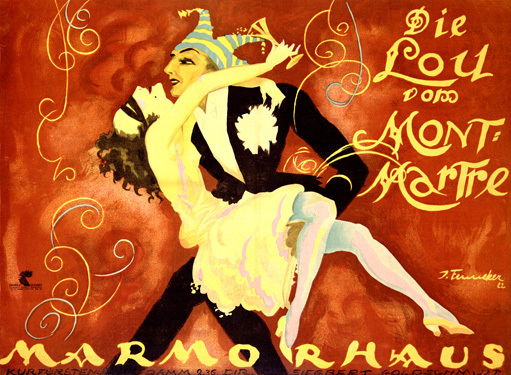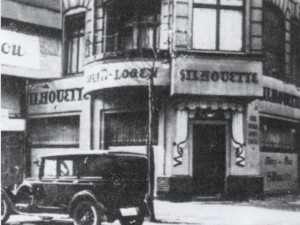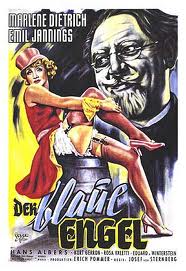

Silhouette
“lacking in splendour and dull on the outside, the interior is cozy and warm like a boudoir. The name is etched across the front in silver, rococo lettering. Inside it may be lacking in width, but not in wealth. The narrowness extends to the dance floor, a long red carpet over parquet. On both sides of the room, a few steps up behind balustrades are intimate Loggias, where you can settle in for a few hours as a spectator”
Führer durch das lasterhafte Berlin – Curt Moreck (1931)
The Silhouette was one of the very few Weimar-era clubs where both male and female cross-dressing was accepted and, indeed, encouraged.

It opened in 1926, on the corner of Geisbergstraße and Kulmbachstraße at the border of Schöneberg and Charlottenburg.
Seemingly always under a blue haze of cigarette and cigar smoke, the club attracted film stars, cabaret artists and some very wealthy nobility. Conrad Veidt, Maria Orska, Anita Berber, Hilde Hildebrand and a young Marlene Dietrich were regulars alongside Princes, Counts and Barons.
Men and women in smoking jackets and smart suits could be seen alongside other men and women in sequined evening gowns and jewels.
The bar area to the front was long and narrow and featured very low lighting and Japanese lanterns. The bar was furnished with many comfortable armchairs, that the regulars would take up position in early in the evening and be served exquisite Martinis by a beautiful and stylish black head-waiter.
This led to smaller room at the rear with a carpeted dance floor and some raised booth seating for more intimate encounters. A small orchestra kept the dancing going with occasional performances throughout the night from female and male drag acts.
Partying until dawn was the norm, when it fell to the enormous bearded doorman, Jonny, to secure taxis for everyone.
It was here, one night early in 1929, that the composer Friedrich Hollaender went looking for Marlene Dietrich.
He found her in one of the booths near the dance floor with a large group of friends and broke the news that she had been cast in the lead role in The Blue Angel. Word went around the club in a flash that Marlene had got her big break, the orchestra immediately started playing Schöner Gigolo, armer Gigolo and Marlene “ordered so much champagne that you could bathe in it”

The club, like so many others, closed in 1933. Today it is an unremarkable residential corner.

